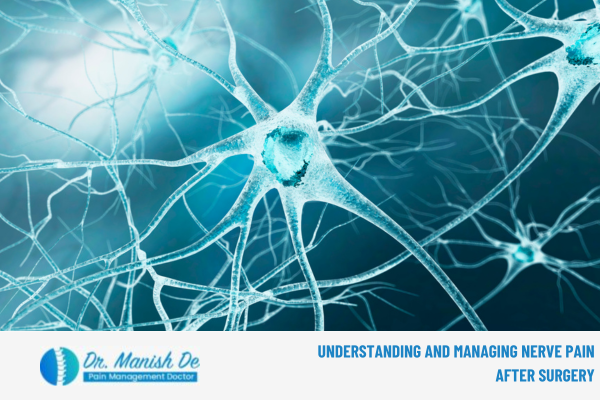Nerve pain, also known as neuropathic pain, is a common issue many people experience after surgery. It can be a sharp, burning, or tingling sensation that may persist long after the surgical wound has healed. Dr. Manish De, one of the best pain management doctors and interventional pain physicians in South Kolkata, explains the causes, symptoms, and management of nerve pain after surgery.
Causes of Nerve Pain After Surgery
Post-surgical nerve pain can result from several factors, such as:
- Nerve Damage During Surgery
Even with the most careful surgical procedures, nerves near the surgical site can be damaged or irritated. This can happen due to direct trauma from surgical instruments or pressure on the nerve during the procedure. - Scar Tissue Formation
After surgery, scar tissue may form around the nerve, compressing it and causing pain. This condition is known as nerve entrapment. - Inflammation
Post-operative inflammation can irritate nearby nerves, leading to pain that can persist for weeks or months. - Chronic Post-Surgical Pain (CPSP)
Some individuals may develop CPSP, a condition in which pain continues for months or even years after surgery. This is often due to nerve injury or dysfunction.
Symptoms of Nerve Pain
Nerve pain after surgery can present in a variety of ways, including:
- Burning or Sharp Pain
Patients often describe the pain as burning, shooting, or stabbing. - Tingling or Numbness
Some individuals may experience numbness or tingling sensations around the surgical site or radiating to other parts of the body. - Increased Sensitivity
Areas near the surgical site may become overly sensitive, with even light touches causing significant pain (a condition called allodynia).
Managing Nerve Pain After Surgery
While nerve pain can be debilitating, various treatment options can help manage and alleviate the discomfort:
- Medications
- Anti-Neuropathic Drugs: Medications like gabapentin and pregabalin are often prescribed to treat neuropathic pain.
- Topical Treatments: Creams containing capsaicin or lidocaine can provide localized relief.
- NSAIDs and Pain Relievers: Non-steroidal anti-inflammatory drugs (NSAIDs) like ibuprofen can reduce inflammation and pain, though they may not be as effective for neuropathic pain specifically.
- Physical Therapy
Engaging in guided physical therapy can help restore function and reduce pain by promoting nerve healing and reducing scar tissue. - Nerve Blocks
Dr. Manish De, as an interventional pain physician, may recommend nerve blocks to relieve pain. These injections contain anesthetic and anti-inflammatory medications to block pain signals temporarily. - Transcutaneous Electrical Nerve Stimulation (TENS)
TENS therapy uses low-voltage electrical currents to stimulate nerves and reduce pain perception. This non-invasive method is often effective in managing post-surgical nerve pain. - Advanced Interventional Pain Treatments
In cases where conventional treatments don’t provide relief, advanced techniques like spinal cord stimulation or radiofrequency ablation may be considered. These procedures target the nerves responsible for pain transmission, offering long-term relief. - Psychological Support
Chronic pain can take a toll on mental health. Seeking psychological support through counseling or cognitive-behavioral therapy (CBT) can help manage the emotional aspects of living with post-surgical nerve pain.
Preventing Nerve Pain After Surgery
While it may not be possible to prevent all instances of nerve pain, certain steps can reduce the risk:
- Proper Surgical Planning: Choosing an experienced surgeon and following pre- and post-operative guidelines can minimize nerve damage during surgery.
- Early Intervention: Addressing pain early after surgery can prevent it from becoming chronic. If you experience nerve pain, it’s essential to consult with a pain specialist like Dr. Manish De for early diagnosis and treatment.
Conclusion
Nerve pain after surgery can be challenging, but with proper diagnosis and a comprehensive treatment plan, it can be effectively managed. Dr. Manish De offers expert guidance and personalized treatment options to help patients regain their quality of life. If you’re struggling with post-surgical nerve pain, consulting a specialist can provide relief and ensure a faster recovery.


